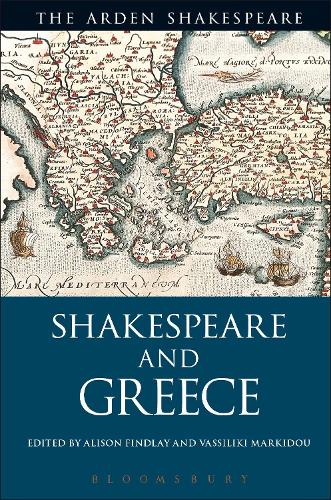
Shakespeare and Greece
(Hardback)
Available Formats
Publishing Details
Shakespeare and Greece
By (Author) Professor Alison Findlay
Edited by Professor Vassiliki Markidou
Bloomsbury Publishing PLC
The Arden Shakespeare
26th January 2017
United Kingdom
Classifications
Tertiary Education
Non Fiction
Literary studies: c 1600 to c 1800
Literary studies: general
822.33
Physical Properties
Hardback
304
Width 129mm, Height 198mm
406g
Description
This book seeks to invert Ben Jonsons claim that Shakespeare had small Latin and less Greek and to prove that, in fact, there is more Greek and less Latin in a significant group of Shakespeares texts: a group whose generic hybridity (tragic-comical-historical-romance) exemplifies the hybridity of Greece in the early modern imagination. To early modern England, Greece was an enigma. It was the origin and idealised pinnacle of Western philosophy, tragedy, democracy, heroic human endeavour and, at the same time, an example of decadence: a fallen state, currently under Ottoman control, and therefore an exotic, dangerous, Other in the most disturbing senses of the word. Indeed, while Britain was struggling to establish itself as a nation state and an imperial authority by emulating classical Greek models, this ambition was radically unsettled by early modern Greeces subjection to the Ottoman Empire, which rendered Europes eastern borders dramatically vulnerable. Focusing, for the first time, on Shakespeares Greek texts (Venus and Adonis, The Comedy of Errors, A Midsummer Nights Dream, Love's Labours Lost, Troilus and Cressida, Timon of Athens, King Lear, Pericles and The Two Noble Kinsmen), the volume considers how Shakespeares use of antiquity and Greek myth intersects with early modern perceptions of the country and its empire.
Reviews
A fascinating collection that brilliantly teases out the tension between the order and authority of a classical Greece and the very different status and nature of a Greece under Ottoman rule. * Times Higher Education *
Shakespeare and Greece, a collection of essays edited by Alison Findlay and Vassiliki Markidou, contributes to a small but growing body of work addressing an important and understudied topic. Framed by an introduction situating the project in Shakespeares literary and cultural landscape, the books eight essays explore different intersections between Shakespeare and the Greek world. Their premises and methodologies vary, but together they make a strong case for the pervasiveness and importance of Shakespeares Greek engagements This volume illuminates a rich topic, and opens inviting directions for further study. * Renaissance Quarterly *
Author Bio
Alison Findlay is Professor of Renaissance Drama and Director of the Shakespeare Programme at Lancaster University, UK and Vassiliki Markidou is an Assistant Professor in English Literature and Culture at the Faculty of English Language and Literature, University of Athens, Greece.
